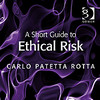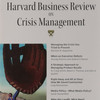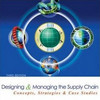 This is – for the time being – the sixth and final review of the books in the Gower Short Guides to Business Risk Series, since so far, only 6 out of 13 have been published. The last one out for review on husdal.com is A Short Guide to Ethical Risk, written by Carlo Patetta Rotta. Corporate social responsibility is growing in importance, and this is a book that provides an overview of the theories of ethics that bear on today’s business world. It is also a book that describes the adoption of appropriate company cultures and corporate governance models, and it is a book that discusses the selection and retention of ethically sound staff and implementation of fair incentive systems. It is a book for companies wishing to survive into the future, simply because developing effective protection against exposure to ‘ethical risk’ is the only possible way forward. Well, not the only possible way, but the only viable way.
This is – for the time being – the sixth and final review of the books in the Gower Short Guides to Business Risk Series, since so far, only 6 out of 13 have been published. The last one out for review on husdal.com is A Short Guide to Ethical Risk, written by Carlo Patetta Rotta. Corporate social responsibility is growing in importance, and this is a book that provides an overview of the theories of ethics that bear on today’s business world. It is also a book that describes the adoption of appropriate company cultures and corporate governance models, and it is a book that discusses the selection and retention of ethically sound staff and implementation of fair incentive systems. It is a book for companies wishing to survive into the future, simply because developing effective protection against exposure to ‘ethical risk’ is the only possible way forward. Well, not the only possible way, but the only viable way.
Gower Short Guides to Business Risk
I am quite happy to have the Gower Short Guides to Business Risk Series as a regular topic on my blog, since the series covers topics such as reputation risk, political risk, fraud risk, ethical risk, procurement risk and customs risk, operational risk, compliance risk, kidnap and ransom risk, corruption risk, equality risk and how to facilitate risk management, all topics that one way or the other can be linked to supply chain risk and business continuity, two of the main pillars of this blog, as I talked about recently.
The Fraud Triangle
What are the prerequisites needed for someone to disregard ethical behaviour? According to Patetta, three elements are necessary: Psychological pressure, Opportunity, and Rationalization. Psychological pressure can stem from an excessive amount of work, very heavy responsibilities, lack of support and guidance, a difficult working environment and a lack of professional fulfilment, to mention but a few possibilities. Opportunity is the ease with which an individual can elude the company’s internal controls. Some internal control methods, as they relate to fraud, are covered in the Gower Short Guide to Fraud Risk. Rationalization is the individual’s ability to justify to oneself a behaviour the individual knows is not morally correct. When all free come together, the stage is set for potentially unethical behaviour.
Retain-Transfer-Mitigate-Avoid
Interestingly, Patetta shows that applying traditional risk management methods of Retain-Transfer-Mitigate-Avoid, which I have reviewed in an earlier post, do not work very well in relation to ethical risk.
Retaining ethical risk is definitely not in line with sound management theory, although yes, some unethical behaviour may not be that unethical internally, but when brought to light for the public at large, it can cause catastrophic damage to reputation, something that is very well covered in the Short Guide to Reputation Risk.
Transfer of ethical risk to third parties does not seem very sensible. Even if core business processes are outsourced, e.g. financial services or IT management, the ethical risk with these operations remains with the company and not with the services provider, regardless of their negligent behaviour, since due diligence should have led the company to seek other providers.
Mitigate or refers to reducing the impacts of ethical risks, and is perhaps a viable option, but is more often than not a kind of “damage control” of already committed actions and internal persecution of those responsible. It does not remove the risk, but it may make it possible to detect small irregularities before they can develop into full-blown public scandals.
Avoid here means eliminating ethical risk, and implies a strategy of active prevention and is a question of ensuring that an individual faced with a moral dilemma voluntarily chooses the most desirable solution from an ethical point of view.
Corporate Social Responsibility
What I like about this book in particular are the first two chapters where Patta argues that in business, ethics and corporate social responsibility go hand in hand.
Ethicality is not a luxury that can be afforded during those periods when the economic climate is positive and financial results are satisfactory, and then, during lean periods, is put aside and far less orthodox business practices are not even sniffed at.
This is a direct reflection of what Archie B. Carroll wrote decades ago about companies having both an institutional and a social responsibility. Ethicality, so Patetta is not an obstacle, but a (if not the) tool to achieve company objectives.
The verdict
This is perhaps an overly short review compared to my reviews of the other books in the series, but that shouldn’t be taken as a sign that this book is less inspiring or less worth reading. It isn’t, and I highly recommend to download the sample chapter, see download link below. There are many books that cover ethics issues and many books that cover business issues, but Patetta manages to merge both. Admittedly, it’s a short and succinct book, but ethics shouldn’t need to be elaborated upon, and paraphrasing a more famous slogan I would like to say that Patetta’s book is about this: “Ethics: Just do it.”
Reference
Rotta, C. (2010) A Short Guide to Ethical Risk. Farnham: Gower Publishing
Author link
- carlopatetta.com: Carlo Patetta Rotta
Publisher link
- gowerpublishing.com: A Short guide to Ethical Risk
- gowerpublishing.com: A Short Guide to Ethical Risk (Chapter Five)
Buy this book
- amazon.com: A Short Guide to Ethical Risk
Related posts
- husdal.com: Book review – Fraud Risk
- husdal.com: Book review – Political Risk
- husdal.com: Book review – Customs Risk
- husdal.com: Book review – Reputation Risk
- husdal.com: Book review – Procurement Risk











